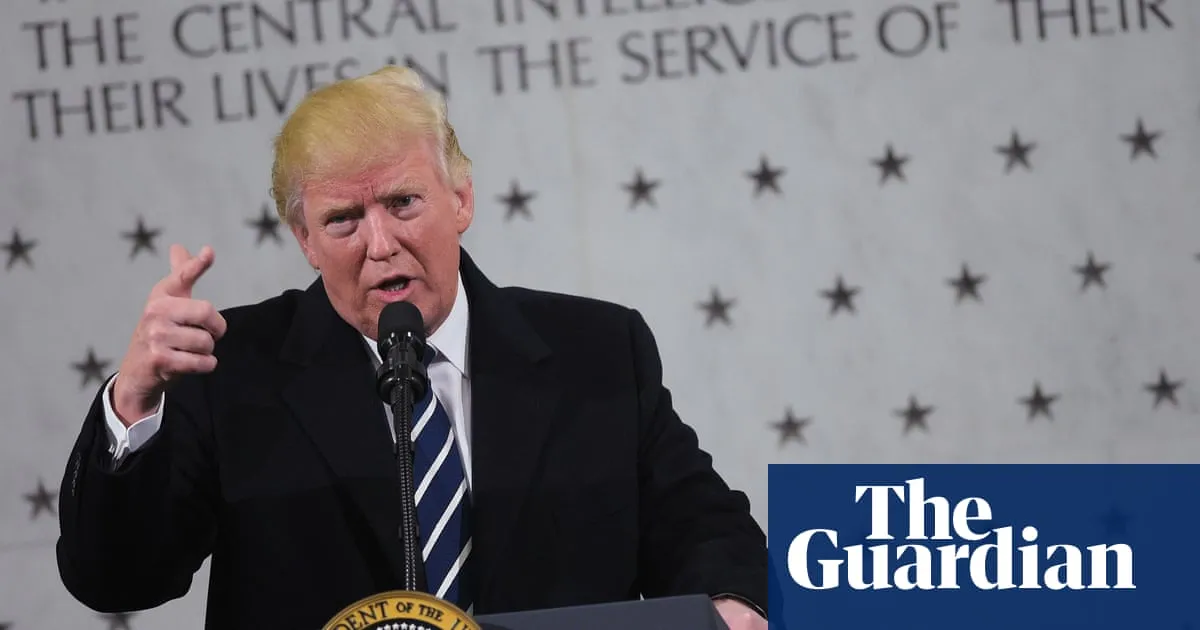
It may seem unusual to express sympathy for the Central Intelligence Agency (CIA), an organization with a notorious history filled with failures and controversies. From the Cuban missile crisis to the post-9/11 torture program, and its involvement in the overthrow of democratically elected leaders, the CIA's record is marred by significant blunders. However, recent political dynamics, particularly the hostility of Donald Trump towards the intelligence community, have prompted even staunch critics to reconsider their stance. Notably, Tim Weiner, a prominent CIA critic and author of the 2007 bestseller Legacy of Ashes, has found himself defending the agency in light of the current political climate.
In a recent interview, Weiner proposed a provocative thought experiment: imagine dedicating years as an intelligence officer to undermining the Kremlin, only to witness the United States aligning with Russia, Iran, and North Korea. This was particularly evident in February when the US voted against a UN resolution condemning Russia's invasion of Ukraine. Weiner articulated a striking realization: “My God, the president of the United States has gone over to the other side. He has joined the authoritarian axis.” This sentiment resonates deeply, given the precarious state of American democracy under Trump’s influence.
In his latest book, The Mission, released on Tuesday, Weiner explores the evolution of the CIA since the events of 9/11. Drawing from extensive interviews with CIA officials, including current deputy director for operations Tom Sylvester, Weiner paints a picture of an organization that seems ill-equipped for contemporary challenges. The CIA, originally designed for a different era, has struggled to adapt, particularly in recognizing the rise of new threats like Al-Qaida and the subsequent disastrous outcomes, including the flawed intelligence regarding weapons of mass destruction (WMDs) and the infamous torture program.
One of the most alarming revelations in The Mission deals with the CIA's unexpected vulnerability during Russia's influence operations in the lead-up to the 2016 presidential election. Weiner describes how Russian intelligence, aided by WikiLeaks, released hacked emails from the Democratic National Committee, severely undermining Hillary Clinton’s campaign. He asserts that this act constituted “an audacious act of political warfare that helped elect a demagogue president of the United States.” While Weiner dismisses the notion that Trump is a Russian asset, he emphasizes that Trump is, without a doubt, “Russia’s ally.”
Following the election, the CIA found itself in a precarious position, aiming to mitigate the very force that had aided Trump’s ascent to power. Tom Rakusan, then the chief of the clandestine service, convened senior officials to address the gravity of the situation, stating, “The Russians stole our f*cking election. How do we make sure this never happens again?” This marked a significant shift in focus for agents who had spent years concentrating on counter-terrorism, redirecting their efforts towards addressing the Russian threat.
As Trump’s presidency continued, his open disdain for the CIA became increasingly evident. Weiner notes that Trump perceives the agency as a central component of a “deep state” conspiring against him. In response, Trump appointed a cadre of “dangerously incompetent and servile acolytes” to key national security positions, including CIA Director John Ratcliffe. Weiner criticizes Ratcliffe, characterizing him as “spineless” and willing to do Trump’s bidding, thus jeopardizing the integrity of the CIA.
Ratcliffe’s actions have included a controversial review of the CIA’s initial assessments on Russia’s interference and a purge of experienced officers. Weiner warns that this ideological purification within the CIA could have dire consequences. “Diversity was one of the CIA’s few superpowers,” he argues, highlighting the importance of having a workforce reflective of the global landscape the agency operates in. The dismantling of diversity initiatives, according to Weiner, represents a self-imposed wound that could severely limit the CIA’s operational effectiveness.
The fallout from Trump’s administration extends beyond the CIA, as allies may hesitate to share sensitive information with the United States, mindful of past indiscretions. The appointment of Tulsi Gabbard as director of national intelligence further compounds these issues, as her lack of experience and accusations of promoting Russian propaganda raise concerns about the reliability of US intelligence leadership. “What ally would share secrets with a dangerously deluded person like that?” Weiner questions, underscoring the growing isolation of the US intelligence community.
Despite his critiques, Weiner expresses a nuanced view of the CIA’s role in safeguarding national security. “I’m not known as a great defender of the CIA,” he admits, “but neither am I a defender of willful ignorance.” He underscores the necessity of intelligence in deciphering threats to the United States, while lamenting the lack of a clear mechanism to gauge the president’s intentions. “What keeps me up at night,” he confides, “is the fact that Trump has put the instruments of American national security in the hands of crackpots and fools.”
As Weiner reflects on the current state of the CIA and American democracy, he acknowledges the limitations of relying on institutional figures to effect change. “We’ve learned, to our sorrow, that Robert Mueller is not going to save us,” he states. The recent mass protests signal a growing public discontent, highlighting the need for civic engagement in safeguarding democracy. “Only we can save ourselves,” Weiner concludes, emphasizing the urgency of collective action in the face of escalating threats.